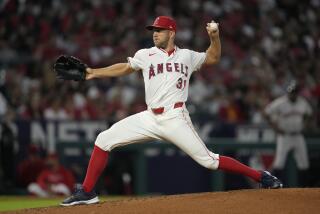Angels’ Velarde Pleased to Return to New York
- Share via
NEW YORK — You hear that Texas drawl, you see those cowboy boots and gaudy belt buckles, and it’s obvious not much of New York rubbed off on Randy Velarde in his eight years with the Yankees.
“I tried to talk like those people--’Hey, yo!’--but I couldn’t do that,” said Velarde, the Angel second baseman. “Sometimes I thought I should start talking to get in the tabloids, but that’s not my style. I’d let the other guys pop off and just sit back, shaking my head.
“I guess what they say is true--you can take the boy out of the country, but you can’t take the country out of the boy.”
But for a country boy from Midland, Tex., Velarde sure seems excited about returning to the big city tonight, when the Angels open a three-game series in Yankee Stadium.
“I can’t wait to hear [Yankee Stadium public address announcer] Bob Sheppard announce my name, ‘Now bahting, Numbah 18, Randy Velarde,’ ” he said in a passable Sheppard impression.
“It’s going to be exciting. Any time you play for a team for that long, there’s a little extra incentive against them. The blood is going to be flowing, there’s going to be a lot of adrenaline . . . I’m going to feel like I’m in a football game or something.”
Velarde remembers the first time he set foot in Yankee Stadium, as a bright-eyed, 25-year-old in 1987. He went to the outfield to peek at the monuments of Ruth, Mantle, Gehrig, et al. He climbed to the top row in the upper deck behind home plate, sat down, and gazed out at the place.
“All the nostalgia, you feel it as you walk through the halls to the clubhouse,” Velarde said. “What that stadium represents, all the great players they’ve had, the pinstriped uniforms that have never changed . . . it all speaks for itself.”
They don’t make bronze busts of utility players in New York, and Velarde felt unappreciated at times with the Yankees. In the winter of 1994-95, in fact, then-Yankee General Manager Gene Michael told Velarde if he had a decent offer from another team he should take it, because the Yankees had three young players who could do his job.
Michael then re-signed Velarde out of the Homestead, Fla., free-agent camp about a month later, and Velarde hit .278 with 46 RBIs in 111 games to help New York to a wild-card playoff berth.
But while the Yankee front office waffled in its support of Velarde, the always-demanding Yankee fans were unwavering in their devotion to him.
“I’ve always said New York fans are a lot smarter than what they’re given credit for,” Velarde said. “They understand when a guy’s giving 100%, when he’s playing hurt. They appreciate the blue-collar players because they’re blue-collar fans.”
Velarde returns to New York at a time the Yankees need him most. With second basemen Pat Kelly and Mariano Duncan on the disabled list, the Yankees are going with an inexperienced second-base platoon of Robert Eenhoorn and Andy Fox.
But Velarde is property of the Angels now, having signed a three-year, $2.45-million contract last winter and moved into a role he had never experienced--everyday player.
It has gone pretty well, but not quite as well as Velarde had hoped.
His defense has been solid--only two errors, and several spectacular plays in 31 games. He’s batting a respectable .269 with 21 runs and 10 RBIs, but he admitted Wednesday he “hasn’t been the lead-off hitter the Angels were looking for.” Velarde has only 12 walks and a team-high 35 strikeouts, and some Angel fans are longing for the days of Tony Phillips.
“He’s trying to replace one of the premier lead-off batters in baseball,” Manager Marcel Lachemann said, “and that’s a tough act to follow.”
Velarde might not follow it much longer. Lachemann dropped him from first to seventh Wednesday against the Boston Red Sox and said Velarde might remain near the bottom of the order.
Which is fine with Velarde.
“I’m not going to lie to you,” Velarde said. “I’m not a lead-off batter.”
But he feels he has proved he can be an everyday player after eight years as a utility man.
“They knew [in New York] what I could do when I was in the lineup on a regular basis,” Velarde said. “When guys struggled, I was out there as much as the guys who played every day. I just wasn’t getting the 500-600 at-bats they were getting.”
More to Read
Go beyond the scoreboard
Get the latest on L.A.'s teams in the daily Sports Report newsletter.
You may occasionally receive promotional content from the Los Angeles Times.







